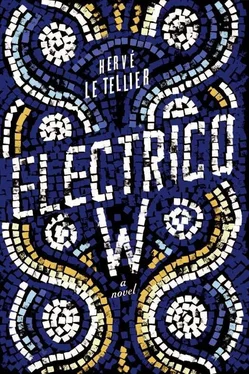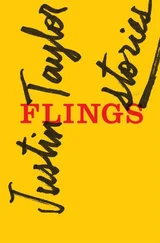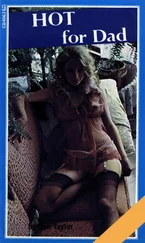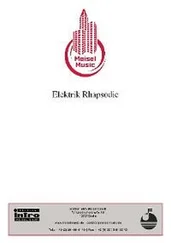I also tried to write a few lines of The Clearing , my novel that I kept putting off till later. I wanted to create the portrait of a man, Pescheux d’Herbinville, whose name would not have gone down in history had he not, on May 30, 1832, mortally wounded one of the greatest mathematical geniuses, Évariste Galois, who was then only twenty. Galois would die of peritonitis at Cochin hospital the following day. The night before the duel, with a sense of urgency, he jotted a sort of scientific will on a few loose sheets of paper, “publicly exhorting the mathmeticians Jacobi or Gauss to give their opinion, not on the accuracy, but the importance of the theorems” he had found. And important they were: they would rank among the fundamental works on algebra and the theory of numbers. Ever since the day I had heard this legendary anecdote, it had fascinated me. At the age of twenty, on the eve of certain death, what things with a decisive impact on humanity could I have scrawled on a scrap of paper?
My pitiful hero, Pescheux d’Herbinville, was a sort of dandy whom some of Galois’s biographers accused of working as a spy for Charles II’s police. But there was nothing to prove this. It seems he and Évariste had been friends, but had fallen in love with the same woman, one Stéphanie-Félicie Poterin du Motel. So little is known about their story that there is plenty of scope for invention. I had made Pescheux an obscure petty noble rather taken with republicanism, a stupid, complacent man, which he no doubt was. Alongside his humdrum pointless existence, I wanted to depict the studious and tumultuous life of an Évariste driven by a passion for mathematics, the epitome of intelligence and youth. So the fictionalized biography of Pescheux was merely a pretext for a novel about mediocrity and a reflection on jealousy. It was an ambitious project, and I probably put too much store by it to get on with it properly. I took my inspiration for the opening passage from Stendhal’s Charterhouse of Parma , hoping I would immediately be unmasked: “On May 30, 1832, the republican Pescheux d’Herbinville arrived at the clearing accompanied by a friend who had just loaded one of the two dueling pistols and informed him that, because his adversary, Évariste, had no witness with him, it would be Évariste who picked the firearm.”
I had struggled to reach the fortieth page of my large black notebook; it measured eight inches by twelve, had the words Registre Le Dauphin, France , on the cover, and comprised two hundred pages marked out in quarter-inch squares. Yes — call it fetishism, superstition, or idiocy — I used the same notebooks as the legendary writer Romain Gary but didn’t succeed in stringing together more than a few words.

The page stayed blank on that particular night. I went out and walked down to the river, to the black glint of the water, and I strolled along the banks, not really thinking about anything. I waited till dawn, till the first ferry drew in, the bars along the port opened, and water could be heard heating in percolators, before making up my mind to return to the hotel. I went back to bed, snoozed until ten in the morning, and let the racket on the street wake me. I found Antonio in the lobby, reading the Jornal de Notícias with no sign of impatience. He had his cameras around his neck, he must already have taken a few pictures. He was the one who suggested having lunch in the old port.
Just as we were about to leave the hotel, an attendant at reception waved Antonio over and handed him a message from a telephone call received that morning. Antonio glanced at it quickly, folded it in four without a word, and thrust it violently in his pocket, as if wishing it would disappear. But, because I was watching, he explained, “It’s not from the paper. I think they’ve forgotten us already …”
He must have sensed I was still curious and felt our budding friendship deserved better than this evasive comment. He took the note back out of his pocket, read it more attentively, folded it again, and put it away. Then he smiled mischievously: “Sometimes going away’s not such a bad idea … Out of sight but not out of mind.”
“Yes, something like that. Or absence makes the flames burn brighter.”
We left the hotel, heading slowly toward the port, and Antonio put film into his Leica.
“I’m going to shoot in black and white. There’s not much light, but it’s interesting light, I might get something out of it. What the paper’s really interested in is the Pinheiro trial, but I’ve just read that it’s been postponed for three days, so we can start with Lisbon.”
I nodded agreement. We had no precise goal, I had made no appointments and didn’t feel like working yet. To use the editor’s rather worn expression, my articles needed to give a feel for the place. Antonio would provide the photos and pen-and-ink sketches. He had a talent for that sort of thing.
I wanted Antonio to make the decisions, but he was keen to talk about Paris, about the woman who had left the message for him. A spell had been broken. I didn’t feel he was talking with any enthusiasm. He described her in bland terms, with no colors coming to the surface, not really haunted by any tender images. Why did Antonio talk about her so inadequately, given he had described Duck so well? Is it all that dangerous to mention your longing and admit to emotions? Every now and then he came to a stop, angled his lens at a street corner, a misshapen facade, a gap between two buildings, and released the shutter without much conviction.
Antonio didn’t love this woman, and I thought of Irene again, and the memory of her terrifies me because it’s everywhere in me, ready to spring up as soon as I’m alone, when all it really is is regret.
She had agreed to see me more than once, had accepted my tender advances, and, even though she rejected my too urgent desire every time, I like to think she always did so gently. She asked only that I be patient. I waited for her love to blossom, as she insisted it should. My feelings grew stronger by the day, and more painful too. I had fallen in love with every detail of her face, with her girlish grin, and even her cruelty.
Perhaps it was the distance she maintained that chained me to her, in the same way that the coolness I sensed in Antonio must have been holding the woman I didn’t know who called him from Paris.
One evening, tired of my persistence, Irene told me I had got everything wrong, she made fun of me: “I’m not going anywhere, I’m not leaving you. You and me, we don’t exist. Anyway, there isn’t anything going on between us.” She was right. That was weeks ago. I realized life had played a hell of a trick on me, letting me come that close to happiness. I decided to get away from Paris.
As I write those words, I don’t see them as shameless or out of place. I only mention my own despair the better to describe Antonio’s indifference. These ideas came to me while he was talking about this woman, and because it was Antonio who inspired them they belong here.
We walked until we came to a Chinese restaurant. It had an international name, something like The Inn of a Thousand Rewards, The Peking Palace, or The Golden Lotus. I didn’t make a note of it, I was overwhelmed with sadness. We were served a sickly rich chop suey, with broccoli drowning in monosodium glutamate, and, without even asking, were given knives and forks. But the exotic décor managed to offset the lack of chopsticks. I tried to steer the conversation toward literature, toward Jaime Montestrela, but Antonio had never heard of him, or even of Eugénio de Andrade. He borrowed my copy of Contos aquosos , opened it at random to page 324, and quickly read a story I had not yet translated.
Читать дальше













